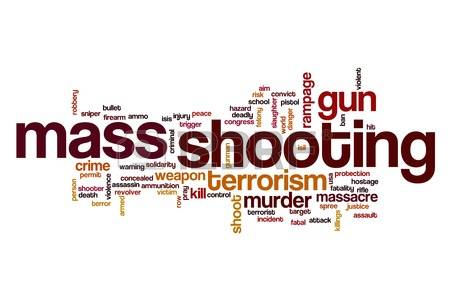In the wake of the Las Vegas shooting, many people are asking why the incident was not labeled an act of terror. How could a tragedy of such magnitude be placed in the same category as workplace violence or gang killings?
Perhaps we are too quick to assume people like the 2016 Pulse nightclub shooter (who carried out the attack alone) are agents of international terror organizations and Dylann Roof, who killed nine people at a church in South Carolina in 2015, is just a “lone wolf” even when his motivation was to commit racist violence.
There are worthy questions about how we categorize violence. However, it’s a mistake to assume any major act of violence is terrorism. Historically, even the Federal Bureau of Investigation has refrained from labeling mass shootings as acts of terror in the early stages of investigations, sometimes even in instances where suspects appear to have been in contact with terror organizations. Whether an incident is a terrorist attack or a mass shooting affects everything from which law enforcement agency has jurisdiction over a case to what charges are brought against suspects.
The type of attack also can affect how state and federal government responds to an incident. Terrorism explicitly demands government do something — terrorist attacks aren’t mere criminal acts but existential threats to democratic society. But doing something to improve security requires tradeoffs in privacy and civil liberties. Sometimes government responds to security threats inappropriately, as some believe Congress did with surveillance provisions of the USA PATRIOT Act. Sometimes counterterrorism measures target vulnerable populations, restrict the movements of law-abiding citizens, and violate civil liberties.
Terrorist attacks are defined by the motives of the individuals who perpetuate them. While there is no universal consensus on defining terrorism, federal agencies agree on some common elements: terrorism includes violence committed to spread fear in a civilian population to accomplish ideological objectives. It is action calculated to coerce people within government and society to agree to concessions. That part is key.
The more people who are influenced by a terrorist act to change their lifestyles or pressure their elected representatives to enact policy, the more powerful the impact of an attack. Public fear is the lifeblood of terrorism. That’s why some terrorist groups are quick to claim responsibility for “inspiring” attacks, even when their agents have had no contact with the individual who perpetuated the event. This makes the organization look more influential than they really are. The more Americans believe terrorist organizations could target any of us next, the more power and influence terrorists accrue.
As writer Ari Schulman outlined in a Wall Street Journal essay, mass shooters often seek vengeance against society. Some dress like commandos and might even look like terrorists. They often exhibit personality traits like entitlement, grandiosity, and narcissism. But rarely do they conduct mass killings to further an ideological agenda or pressure government officials to change policy. Rather the violence is a sort of twisted theatrical performance bringing to fruition their anger over the perceived injustices inflicted upon them.
Just as it was a mistake for right-leaning people to assume the Pulse nightclub shooter or the San Bernardino attackers were operating on the direct orders of international terror organizations, it’s a mistake for those on the left to insist on calling mass shootings terrorist attacks even when a shooting sometimes employs similar tactics or creates devastation of similar magnitude. Let’s refrain from calling mass shootings “terrorist attacks” until the facts are in.








































admin in: How the Muslim Brotherhood betrayed Saudi Arabia?
Great article with insight ...
https://www.viagrapascherfr.com/achat-sildenafil-pfizer-tarif/ in: Cross-region cooperation between anti-terrorism agencies needed
Hello there, just became aware of your blog through Google, and found ...